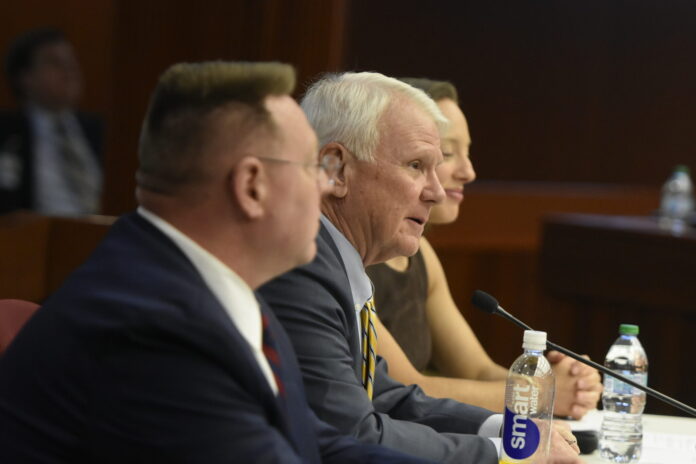
(Georgia Recorder) — A House committee advanced a bill Friday that Speaker Jon Burns says will protect female athletes, but opponents say it targets transgender girls who want to play girls’ sports from kindergarten to college and could remove protections for trans people under the state’s hate crime law.
“I’m blessed to have four granddaughters, very blessed to have four granddaughters, and they’re the reason why this issue is so very, very important to me, and so very important to Georgians and people across this entire country,” Burns said. “It’s simple. Just good common sense to me as the (the bill’s author, Rep. Josh Bonner) alluded to. Biological men have an undeniable and scientifically proven advantage against women when it comes to athletic competition.”
The Riley Gaines Act, named after a champion swimmer and outspoken opponent of transgender sports participation, would mandate teams be based on sex as assigned at birth and prevent schools from allowing people assigned male at birth from playing on teams designated for females.

Gaines testified via Zoom Friday about a 2022 competition held at Georgia Tech in which she and other cisgender women swimmers competed against and shared a locker room with transgender swimmer Lia Thomas.
“We were emotionally blackmailed into silence and submission by allowing Thomas to join the women’s team and compete in women’s collegiate meets,” she said. “The University of Pennsylvania, the Ivy League, and the colleges and universities, including Georgia Tech, that hosted Thomas at these meets, prevented women from competing at all, subject to female swimmers to a loss of privacy and dignity, inflicted emotional harm on female swimmers, and suppressed our free speech rights as female athletes to advocate for our own rights.”
The NCAA changed its eligibility rules after that competition following numerous complaints.
The bill also specifies that schools must provide separate changing facilities, restrooms and sleeping facilities for athletic competitions, with accommodations for students who don’t feel comfortable in the facilities they are required to use.
The bill contains exceptions for people including custodians or maintenance workers doing their jobs as well as people responding to emergencies. The committee amended the bill Friday to include coaches, trainers and team doctors of the opposite sex who are entering the locker room for halftime strategizing or to render other competitive aid.
But some LGBTQ advocates say the part they are most concerned with has nothing to do with sports. The House bill goes further than a different girls’ sports bill passed by the Senate, replacing the word “gender” with “sex” throughout the state’s code.
Sex refers to the physical characteristics associated with being male or female, while gender describes a person’s state of mind and relation to societal norms.
“The language that was added in the final sections goes beyond anything that is to do with sports. It’s an all-out attempt to strip transgender Georgians of their ability to live the same life that everybody else does in the state of Georgia,” said Jeff Graham, executive director of Georgia Equality, an LGBTQ advocacy group.
Graham said he worried changing language in multiple code sections could produce unfortunate repercussions.
“There are unintended consequences that are going to have serious implications, not just for the transgender community, but I worry for girls and the women across the board,” he said.

Powder Springs Democratic Rep. David Wilkerson said he is concerned that the language could remove transgender Georgians’ protection under the state’s hate crimes law.
That law provides additional fines and jail time for people who commit crimes motivated by factors like race, religion, sexual orientation or disability. Wilkerson and others argue removing gender from that list would lift protections in cases where people are attacked because they are transgender.
“So sex is how you’re born, according to this definition, male or female,” Wilkerson said. “Gender is how you identify. So yes, if someone identifies as a sex that they’re not born with and they’re being attacked because of that, they have taken that protection out of the law.”
“We never want to come in here and lessen somebody’s rights and under this bill, their rights would be lessened,” he added. “The protections under the law would be lessened under this.”
Bonner said that’s not how the bill works. He said gender is never defined in Georgia state code and replacing it with sex will clear things up.
He said a transgender person who is targeted for a crime because of their identity would not lose any rights.
“We believe that person still has the full protections of the hate crimes bill as passed,” he said. “All we’re doing is removing the word gender, replacing it with sex, because even under the situation that you put forward, it is still an issue of sex.”
“(A suspect) is making their decision based on someone’s perceived sex,” he added. “And so whether you want to call it transgender or whatever you want to call it, they still have that protection under the law, and we’ve seen, and there are cases in which the courts do agree with that, because gender is not a defined term in Georgia code, but now sex will be. So in fact, that individual that you mentioned will have a greater protection than they have today.”
Chelsea Thompson, an attorney for the evangelical conservative lobbying group Frontline, who helped author the bill, said the U.S. Supreme Court case Bostock v. Clayton County supports Bonner’s position. In that case, which is viewed as a landmark for LGBTQ rights, the majority ruled that firing an employee because they are gay or transgender is a form of sex discrimination.
“In the opinion, the Supreme Court says it is impossible to discriminate against a person for being homosexual or transgender without discriminating against that person, against that individual based on sex,” she said.
Responding to reporters’ questions in the hallway outside the committee meeting, Burns implied he wants the hate crime to continue to cover transgender Georgians.
“We’re going to protect everyone,” he said. “We’re going to be fair.”
LETTER TO THE EDITOR







